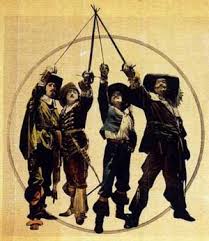
Ah, the Three Musketeers, Athos, Porthos, Aramis, and, of course, d’Artagnan – righting wrongs, fighting evil, and sharing witty remarks along the way (essentially the 17th century version of The Avengers). Their motto, “all for one and one for all”, has become the norm when cheering for teamwork and presenting a united front in the face of hardship or a common goal.
Interestingly, in the late19th century, the Swiss used the phrase as part of a campaign to bring about a feeling of solidarity and national unity during troubled times (following widespread flooding in the Alps), and it’s become their unofficial, but traditional, national motto.
The phrase was perfect for that particular campaign, as it really evoked that spirit of support and common accountability, reminding everyone that one is not successful unless everyone is successful.
So what does that have to do with business processes?
Everything.
All too often Nicole and I come across organizations with detailed strategic plans, tactical plans and clear roles & responsibilities, and yet they are either failing in their execution, or executing on the backs of employees who are demoralized, frustrated, and just plain tired.
Nine times out of ten, they’re missing that “all for one and one for all” mentality. Instead, they have organizational structures that promote an insular focus based on empire-building and individual success. Common accountability is nowhere to be seen.
The people in an organization are like the players on a sports team. On a winning team, each individual has a defined role, interacts with other people at set times, understands their goals and can compare themselves against performance metrics. Most of all, they know they simply can NOT be successful unless their team mates are successful. Who cares how many goals you can score if no one can pass you the puck and the defense can’t keep the other team away from the net? (I can’t believe I just used a hockey analogy… I don’t even watch it. Go Leafs!)
you can score if no one can pass you the puck and the defense can’t keep the other team away from the net? (I can’t believe I just used a hockey analogy… I don’t even watch it. Go Leafs!)
A successful organization is one in which it behooves someone to make a colleague successful, because the individual’s gain is tied to the colleague’s success. It’s nice to take the high road and hope everyone will be altruistic in their approach (helping the other person be successful simply because it’s the right thing to do). However we know that although many people operate this way, it is often not the norm in a culture of pressing deadlines and reduced budgets.
Therefore, whether it’s via financial reward or some other kind of reward or benefit, mutual goals are critical to developing that atmosphere of collaboration and camaraderie.
Five Ways to Instill that “All for One” Culture
- Start to change your organizational culture by referring to employees as team members, and not as “staff”. It’s a small thing, but it really helps.
- If you have a bonus structure, create bonus criteria that include a shared or common accountability as well as individual performance. Many companies have 1/3 individual performance, 1/3 divisional performance, and 1/3 company performance as the weighting.
- If you don’t have a formal bonus structure, develop another means of rewarding collaboration. Tie performance to a common goal, and reward successful teams according to the type of reward that is most meaningful for them. (Don’t know what that is? Ask!)
- Develop key corporate processes and performance metrics that support both the ability of teams to work together towards the goal and their ability to measure progress towards achieving that goal.
- Communicate! Communicate! Communicate! It sounds simple, but it’s often left out. Don’t forget to communicate the way people need to hear it – for some it’s visual, for some it’s written, and for others it’s auditory. Do whatever works, even if it’s all three.
Do you have a structure that encourages collaboration? Tell us about it! Give us a shout via Twitter @whiteboardcons using#betterfastercheaper or email us at info@whiteboardconsulting.ca/staging.
Until next time,
Ruth.
